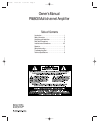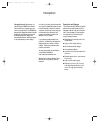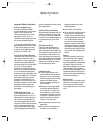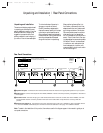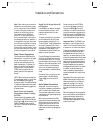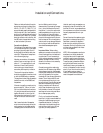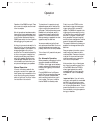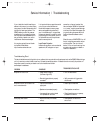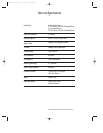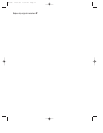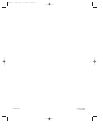Installation and Connections
5
Cables run inside walls should have the
appropriate markings to indicate listing
with UL (“CL-2/CL-3”), CSA (“FT-4”) or
appropriate safety agency standards that
may be required in your area. Questions
about running cables inside walls should
be referred to your installer or a licensed
electrical contractor who is familiar with
the NEC and/or the applicable building
or electrical codes in your area.
Connections to Speakers
The final step of the installation process
is to connect the amplifier to your speak-
ers using high-quality cable. A pair of
binding posts is provided for each chan-
nel output. These posts will accept bare
wire or banana-type plugs.
Note that one conductor of the speaker
cable will have no markings or an indi-
cation of “-” for negative polarity, and
the other will have a red line, brand-
name markings, a colored thread or
some other positive-polarity indication.
The wire with the positive indication
should be connected to the red terminals
on both the PA5800 and your speakers.
The negative wire should be connected to
the black terminal on the PA5800 and
the speakers.
If bare wire is used for connections, strip
approximately 3/4” (20mm) of insula-
tion from the end of each wire and care-
fully twist the strands of each conductor
together. Be careful not to cut the indi-
vidual strands or twist them off; for opti-
mal performance, all strands must be
used.
Next, loosen the knobs of the speaker
output terminals far enough so that the
cap moves back on its threads past the
U-shaped groove at the back end of the
terminal. Making certain that you
observe polarity by connecting the nega-
tive (
-
) wire to the black terminal and
the positive (
+
) wire to the red terminal,
pass the exposed wire through from the
top of the slot until the wire is visible
from the bottom end. Holding the wire in
place, twist the cap back so that the con-
nection is secured. Do not overtighten or
use tools, as this may damage the plastic
terminal cap or break the delicate wire
strands and decrease system perfor-
mance.
Important Note: When making
speaker wire connections, be certain that
none of the strands from one lead touch
any other lead. This will cause a short
circuit and may damage you amplifier or
speakers. Damage from short circuits
caused in this manner is not covered by
the product warranty.
Connections may also be made using
standard 4mm OD banana plugs. Before
using a banana-type jack, make certain
that the plastic screw caps on the PA5800
are firmly tightened by turning them
clockwise until they are snug against the
chassis. This will ensure that the maxi-
mum surface area of the plug is in con-
tact with the jack. Once the wire has been
attached to the banana plug following
the plug manufacturer’s instructions,
simply insert the banana plug into the
hole provided on the rear of the colored
screw caps on the terminal posts. Be cer-
tain to observe proper polarity.
Finally, run the cables to the speaker
locations. It is highly recommended that
the length of cable connecting any pair
of speakers be identical. For example,
make certain that the cable length con-
necting left and right front or left and
right rear (surround) speakers is
identical, even though one speaker may
be physically closer to the amplifier than
the other. Do not coil any excess cable, as
this may become an inductor that creates
frequency response variations in your
system.
Connect the wires to the speakers, again
being certain to observe proper polarity.
Remember to connect the negative or
black wire to the matching terminal on
the speaker. Similarly, the positive or red
wire should be connected to the like ter-
minal on the speaker.
NOTE: While most speaker manufactur-
ers adhere to an industry standard of
using black terminals for negative and
red ones for positive, some manufactur-
ers may not adhere to this configuration.
To ensure properly phased connections
and optimal performance, consult the
identification plate on your speaker ter-
minals, or the speaker’s manual to verify
polarity. If you do not know the polarity
of your speaker, ask your dealer or
installer for advice before proceeding, or
consult the speaker’s manufacturer.
HK1346 12.21.98 1:52 PM Page 7




